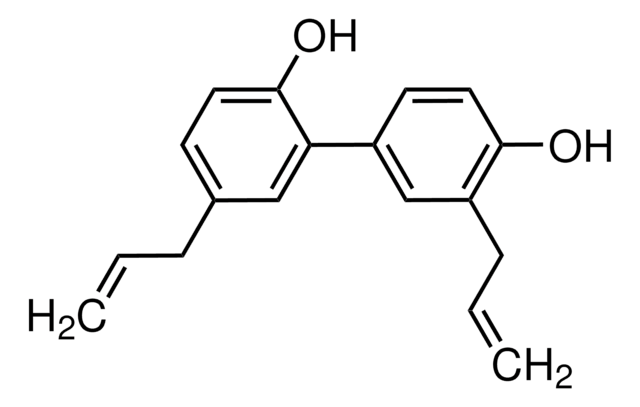Wichtige Dokumente
P0020
Pristimerin
Synonym(e):
Celastrol-methylester
Größe auswählen
Größe auswählen
About This Item
Empfohlene Produkte
Assay
≥98% (HPLC)
Form
powder
Lagerbedingungen
protect from light
Farbe
orange
Löslichkeit
DMSO: ≥5 mg/mL
Lagertemp.
−20°C
SMILES String
COC(=O)[C@]1(C)CC[C@]2(C)CC[C@]3(C)C4=CC=C5C(C)=C(O)C(=O)C=C5[C@]4(C)CC[C@@]3(C)C2C1
InChI
1S/C30H40O4/c1-18-19-8-9-22-28(4,20(19)16-21(31)24(18)32)13-15-30(6)23-17-27(3,25(33)34-7)11-10-26(23,2)12-14-29(22,30)5/h8-9,16,23,32H,10-15,17H2,1-7H3/t23-,26-,27-,28+,29-,30+/m1/s1
InChIKey
JFACETXYABVHFD-WXPPGMDDSA-N
Suchen Sie nach ähnlichen Produkten? Aufrufen Leitfaden zum Produktvergleich
Anwendung
Biochem./physiol. Wirkung
Leistungsmerkmale und Vorteile
Lagerklassenschlüssel
11 - Combustible Solids
Flammpunkt (°F)
Not applicable
Flammpunkt (°C)
Not applicable
Hier finden Sie alle aktuellen Versionen:
Analysenzertifikate (COA)
Die passende Version wird nicht angezeigt?
Wenn Sie eine bestimmte Version benötigen, können Sie anhand der Lot- oder Chargennummer nach einem spezifischen Zertifikat suchen.
Besitzen Sie dieses Produkt bereits?
In der Dokumentenbibliothek finden Sie die Dokumentation zu den Produkten, die Sie kürzlich erworben haben.
Artikel
We offer many products related to cannabinoid receptors for your research needs.
Active Filters
Unser Team von Wissenschaftlern verfügt über Erfahrung in allen Forschungsbereichen einschließlich Life Science, Materialwissenschaften, chemischer Synthese, Chromatographie, Analytik und vielen mehr..
Setzen Sie sich mit dem technischen Dienst in Verbindung.







